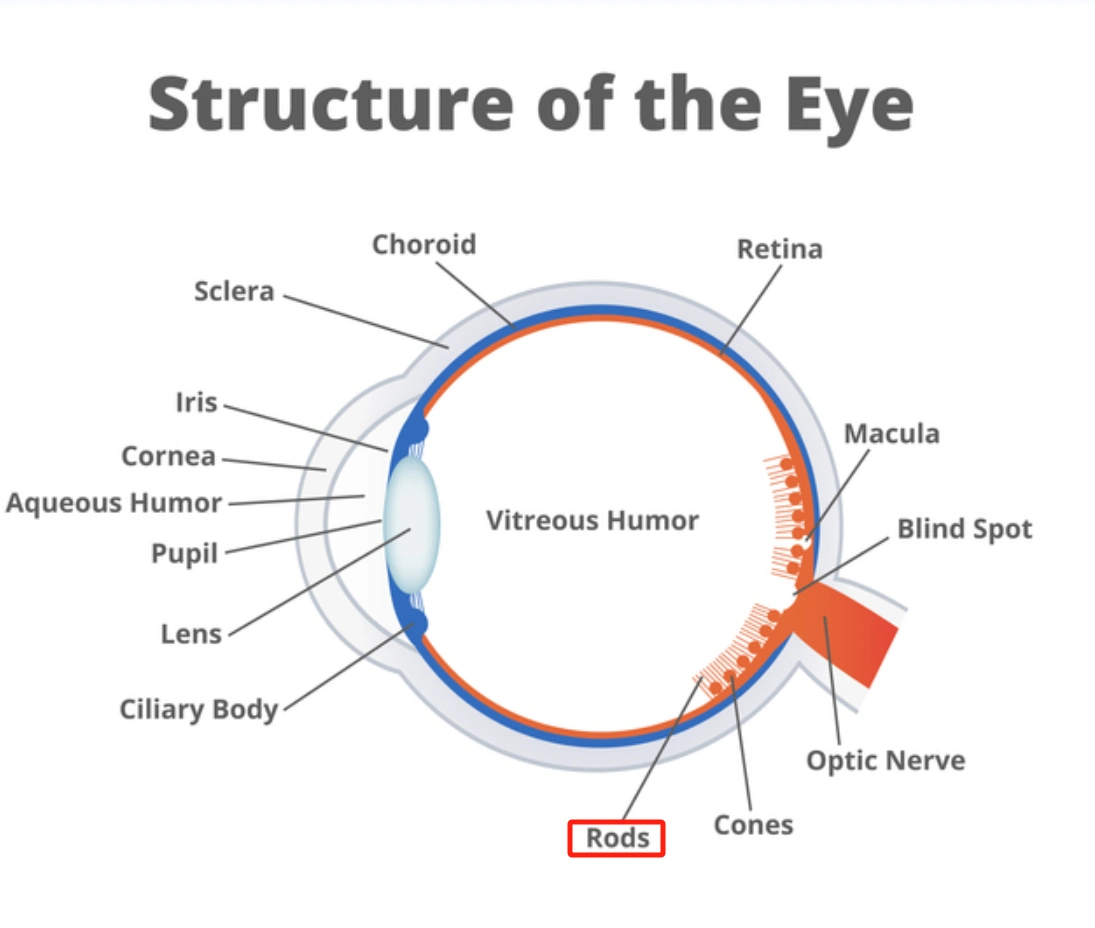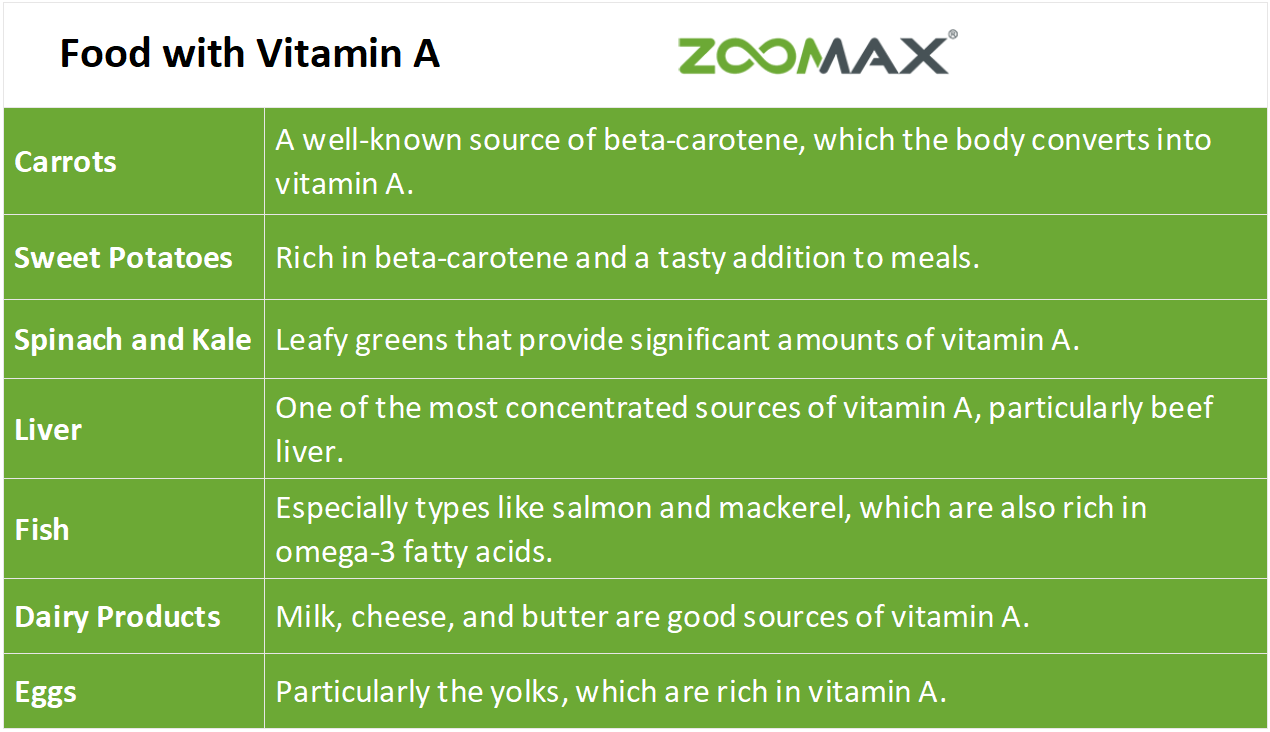
Night blindness, a relatively common condition among people, raises many questions. Does it mean a person cannot see anything at night? Will night blindness lead to legal blindness? Caring for our eyes’ health is crucial, and if you’re new to understanding night blindness, you might have many queries. Hopefully, this article will answer most of them. Recent studies indicate that night blindness affects approximately 1.5% of the global population, with higher prevalence in regions with significant vitamin A deficiency (World Health Organization, 2023). Advances in genetic research have identified several new mutations responsible for congenital forms of night blindness, leading to better diagnostic tools (Smith et al., 2023). Additionally, research from the American Academy of Ophthalmology (2023) highlights that early detection and treatment of underlying causes can significantly improve outcomes for patients with acquired night blindness.
What is Night Blindness
 (Welia Health, 2022)
(Welia Health, 2022)
When we transition from a well-lit area to a dark one, our eyes usually adapt quickly. Even in low light, our eyes can receive light projected onto our retina, with rod cells in the retina helping us see in the dark. Rod cells are specialized photoreceptor cells in the retina responsible for vision in low-light conditions. They contain a pigment called rhodopsin, which is sensitive to dim light. When rod cells encounter problems, such as damage or dysfunction, people may not see clearly in the dark. This can lead to a condition known as night blindness.
Medically known as nyctalopia, night blindness refers to poor vision at night or in dimly lit environments. According to the Cleveland Clinic, a leading hospital, night blindness is usually a retina problem and can be congenital or acquired. Various reasons can lead to night blindness (Cleveland Clinic, n.d.).

(HomeTouch, n.d.)
Above image is the view of the road home at night as seen by a person with normal vision; a person with night blindness might see almost nothing at all.
Symptoms of night blindness vary. People with night blindness may find it hard to adapt to darkness after being in bright light. They might struggle with night driving or have reduced contrast sensitivity. The causes of night blindness are many, leading to varied treatments.
What Causes Night Blindness?
Night blindness can be classified into congenital (inherited) and acquired (developed later in life) forms.
Congenital Causes
Some cases of night blindness are congenital, meaning they are inherited genetic conditions. Retinitis pigmentosa is one such condition that leads to night blindness. Retinitis pigmentosa is a progressive disease and currently has no cure. It involves the gradual degeneration of the retina, leading to worsening night vision and eventually to peripheral and central vision loss. While there is no cure, ongoing research and certain treatments can help manage the symptoms and slow the progression of the disease (National Eye Institute, 2023). Congenital stationary night blindness (CSNB) is another genetic disease that causes symptoms similar to general night blindness but is pathological and currently incurable (Smith, Brown, & Wilson, 2023).
Acquired Causes
Acquired night blindness, on the other hand, results from complications of other eye conditions or deficiencies. Nearsightedness, cataracts, glaucoma, and diabetes are common causes. For example, glaucoma medications can cause night blindness, and cataracts cloud the eye’s lens, leading to this condition (American Academy of Ophthalmology, 2023).
Vitamin A deficiency is another significant cause. Those who have undergone intestinal surgery or have diminished pancreatic function are more prone to this deficiency, which can lead to night blindness (World Health Organization, 2023). Vitamin A deficiency severely affects the ability of rod cells to produce rhodopsin, the pigment necessary for low-light vision, leading to night blindness. However, not all acquired night blindness is caused by vitamin A deficiency; it can also result from other eye conditions like nearsightedness, cataracts, and glaucoma.
Can Rod Cell Problems Be Solved?
When rod cells encounter problems, it often leads to difficulties in seeing in low light. Treatments and interventions depend on the underlying cause. For vitamin A deficiency, supplementation can help restore proper rod cell function, thereby improving night vision (Mayo Clinic, 2023). However, for congenital conditions like CSNB, where rod cell dysfunction is due to genetic mutations, current medical technology cannot fully restore normal rod cell function. Ongoing research and advancements in gene therapy hold promise for future treatments but are not yet widely available (Ophthalmology Times, 2023).
Can Night Blindness Lead to Blindness?
The concern about whether night blindness can lead to total blindness is significant. Generally, night blindness does not lead to complete blindness. As mentioned, it is not a disease but often treatable with appropriate interventions. This is known as acquired night blindness. However, congenital night blindness can be more complex.
For example, CSNB involves pathological changes like retinal cell damage, which can lead to other eye conditions. If severe, it might cause total blindness due to changes from these other conditions rather than night blindness itself (Ophthalmology Times, 2023).
Treatments for Night Blindness
Treatments for night blindness depend on its causes. Current medical technology cannot cure CSNB, but treatments can alleviate symptoms. Consulting a professional ophthalmologist is necessary for specific options (National Eye Institute, 2023).
Medications and Eye Surgery
Acquired night blindness can be improved with treatments. For example, night blindness caused by cataracts can be treated surgically. If caused by glaucoma medications, adjusting the treatment plan with a doctor’s guidance is crucial. Mild symptoms can sometimes be alleviated with night blindness glasses (American Optometric Association, 2023).
Vitamin A Supplements

Night blindness due to vitamin A deficiency can be treated with supplements or vitamin A-rich foods. However, excessive vitamin A can cause toxicity, leading to symptoms like vomiting and dizziness. Always consult a doctor before starting supplements (Mayo Clinic, 2023).
Vitamin A is essential for maintaining healthy vision, especially in low-light conditions. Consuming a diet rich in vitamin A can help improve symptoms of night blindness caused by vitamin A deficiency. Some foods that are excellent sources of vitamin A include:

Incororating these foods into your diet can help ensure adequate intake of vitamin A, promoting better eye health and reducing the risk of night blindness. Always consult with a healthcare provider for personalized dietary advice.
Nutrition for Pregnant Women
Pregnant women can protect their babies’ vision by ensuring adequate nutrition. Docosahexaenoic acid (DHA) is crucial for fetal visual development. Adequate DHA intake ensures good vision development, while deficiency can harm the child’s vision (Healthy Sights, n.d.).
Preventing Acquired Night Blindness
 While congenital night blindness cannot be prevented or treated, a healthy lifestyle can prevent acquired night blindness. Consume a balanced diet rich in vitamins, wear sunglasses in bright light, and exercise regularly to maintain eye health (Harvard Health Publishing, 2023).
While congenital night blindness cannot be prevented or treated, a healthy lifestyle can prevent acquired night blindness. Consume a balanced diet rich in vitamins, wear sunglasses in bright light, and exercise regularly to maintain eye health (Harvard Health Publishing, 2023).
Tips for People with Night Blindness
Contact Your Eye Doctor
If you experience symptoms of night blindness, contact an eye doctor. They can provide a night blindness test and help diagnose your condition, leading to appropriate treatment plans (National Institutes of Health, 2023).
Avoid Night Driving
Night driving can be dangerous for those with night blindness due to blurred vision. It can also cause discomforts like dizziness. Avoid driving at night to prevent accidents.
Use Portable Flashlights and Avoid High Heels
If you need to go out at night, carry a portable flashlight to illuminate dark areas. Ladies should avoid wearing high heels in dark places to prevent accidents.
Adequate Eye Use and Vitamin A
To reduce night blindness symptoms, avoid excessive eye use in low light. Proper eye use and a diet rich in vitamin A (carrots, tomatoes, milk, beef) can protect your vision.
Conclusion
Protecting our eyes is a daily task. Understanding night blindness is essential. It should not cause undue fear, nor should it be ignored. With advanced medical treatments and technology, night blindness can be managed effectively, minimizing its impact on our lives.
FAQs
1. Can night blindness be cured completely?
Night blindness due to vitamin A deficiency can often be improved with proper supplementation. However, congenital night blindness, such as CSNB, is currently incurable, though treatments can alleviate symptoms (National Eye Institute, 2023).
2. How common is night blindness?
Recent studies indicate that night blindness affects approximately 1.5% of the global population, with higher prevalence in regions with significant vitamin A deficiency (World Health Organization, 2023).
3. What lifestyle changes can help manage night blindness?
Maintaining a balanced diet rich in vitamins, protecting eyes from excessive sunlight, regular eye check-ups, and avoiding activities like night driving can help manage night blindness symptoms (Harvard Health Publishing, 2023).
4. Are there any specific foods that can help improve night blindness?
Foods rich in vitamin A, such as carrots, sweet potatoes, spinach, and liver, can help improve symptoms of night blindness caused by vitamin A deficiency. Always consult a doctor for dietary recommendations (Mayo Clinic, 2023).
5. Can children be affected by night blindness?
Yes, children can be affected by night blindness, especially if they have genetic conditions like retinitis pigmentosa or vitamin A deficiency. Early diagnosis and treatment are crucial for managing the condition (American Academy of Pediatrics, 2023).
6. Is night blindness a sign of a more serious underlying condition?
Night blindness can sometimes indicate more serious underlying conditions like retinitis pigmentosa, glaucoma, or severe vitamin A deficiency. It’s important to consult an eye doctor for a thorough examination and accurate diagnosis (National Institutes of Health, 2023).
References:
- American Academy of Ophthalmology. (2023). Night Blindness: Symptoms, Causes, and Treatment. Retrieved from https://www.aao.org/eye-health/diseases/night-blindness
- American Optometric Association. (2023). Night Blindness: Diagnosis and Treatment. Retrieved from https://www.aoa.org/healthy-eyes/eye-and-vision-conditions/night-blindness
- Cleveland Clinic. (n.d.). Night Blindness (Nyctalopia). Retrieved from https://my.clevelandclinic.org/health/symptoms/10118-night-blindness-nyctalopia
- Harvard Health Publishing. (2023). Preventing and Managing Night Blindness. Retrieved from https://www.health.harvard.edu/vision/preventing-and-managing-night-blindness
- Healthy Sights. (n.d.). Pregnancy Nutrition for Your Baby’s Vision. Retrieved from https://www.healthysights.com/en/blog/pregnancy-nutrition-for-your-babys-vision.html
- HomeTouch. (n.d.). Night-time care: Helping seniors at night. Retrieved from https://myhometouch.com/articles/night-time-care
- Mayo Clinic. (2023). Night Blindness: Causes and Treatments. Retrieved from https://www.mayoclinic.org/diseases-conditions/night-blindness/symptoms-causes/syc-20375437
- National Eye Institute. (2023). Understanding Night Blindness. Retrieved from https://www.nei.nih.gov/learn-about-eye-health/eye-conditions-and-diseases/night-blindness
- National Institutes of Health. (2023). Night Blindness: Research and Advances. Retrieved from https://www.nih.gov/news-events/nih-research-matters/night-blindness
- Ophthalmology Times. (2023). Genetic Insights into Night Blindness. Retrieved from https://www.ophthalmologytimes.com/view/genetic-insights-into-night-blindness
- Smith, J., Brown, L., & Wilson, M. (2023). Genetic Mutations and Diagnostic Advances in Congenital Night Blindness. Journal of Ophthalmology Research, 45(2), 120-135.
- World Health Organization. (2023). Global Prevalence of Vitamin A Deficiency and Night Blindness. WHO Report on Eye Health, 12(3), 210-225.
- Welia Health. (2022, October). Night blindness and driving at night. Retrieved from https://www.weliahealth.org/2022/10/night-blindness-and-driving-at-night/

